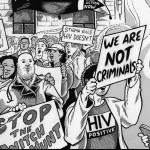We are proud to announce that the recipient of the Robert Wood Johnson Foundation - AIDS United Award for Health Equity, presented by AIDS United, is D. Rashaan Gilmore, the founder, president and CEO of BlaqOut Inc.
The vision of the Robert Wood Johnson Foundation is to build a culture of health to ensure the achievement of health equity. This award honors those who have successfully implemented systems changes and promoted and highlighted solutions at the community level that lead to health equity.
Gilmore describes himself as a “serial entrepreneur, community connector, organizer and collaborator” who is passionate about using his voice in service of marginalized communities to make a difference. Gilmore says he “brings his candor, intelligence and wit to empower individuals to assert their right to be visible and thrive.”
“I have had the pleasure of working with Rashaan in various capacities during my time at AIDS United,” said AIDS United Capacity Building Specialist Carsen Beckwith. “Whether through BlaqOut or otherwise, Rashaan continuously stands out as a leader for providing care and support to communities most impacted by HIV. I know that Rashaan is a fiercely committed advocate who overcomes immense barriers and obstacles to advance Black queer health. He engages with intentionality, innovation and community at the center of his work. No one else so prominently comes to mind when thinking of building a culture of health and health equity.”
AIDS United caught up with Gilmore to learn more about his story.
How did you get engaged as an advocate?
In one way or another, I have been an advocate for those left out or left behind by the people or systems that were supposed to care for them my whole life.
Specifically relative to the field of HIV prevention and care, it was quite unexpected. I literally got a phone call (seemingly) out of the blue from a local FQHC [federally qualified health center] inquiring about my interest in taking over a multi-year CDC direct HIV prevention grant (“Project I Am”), which was struggling mightily to meet its target of providing HIV prevention programming and services to Black and Latinx same-gender-loving men, ages 13 to 29.
It turns out that it was two close friends who worked in the field who nominated me for the position. I declined the offer twice before finally accepting the position—which I agreed to do for only one-year to get things back on track. As destiny would have it, I stayed for four before leaving to found BlaqOut.
What are you most proud of in your work?
I am most proud of the way we have come together as a community, with limited resources and an underdog status, to accomplish significant change on behalf of the community we love. We are showing every doubter that Black queer people — regardless, or perhaps especially because of our varied relationships to HIV — can lead for ourselves.
View this post on Instagram
Can you tell us about how BlaqOut Inc. came about?
BlaqOut Inc., was founded in 2017 as a successor to Project I Am. After five years of Project I Am, the CDC [Centers for Disease Control and Prevention] extended funding for six months, giving the newly proposed BlaqOut program time to secure local support.
Key to BlaqOut’s 2017 agenda was conducting a community needs assessment called the BlaqOut Vision 2020 Study. This groundbreaking research was conducted in partnership with the University of Missouri-Kansas City School of Medicine Community Health Research Group to promote a more engaged, healthier Black queer community. The survey’s findings would help us develop culturally tailored, multilevel health promotion interventions, which BlaqOut is today actively implementing.
What changes do you hope to see over the next ten years as we continue to work toward ending the HIV epidemic?
On our way to ending the epidemic, I wish above all that those who are living with HIV begin to experience a world free of stigma within themselves, in their lives and families, in their communities and everywhere they go. That means those of us not living with HIV do the essential work of becoming better educated, more compassionate and less harmful to PLWHIV for our own sakes as well as theirs.
What inspires you on your most challenging days?
Throughout my life, three things have always gotten me through difficult times: My belief in myself and the greater plan for my life; the unconditional love of my family; and the unwavering support of my friends. It also helps to pause and reflect on just how far I have come and all that I have accomplished every now and again.
Reflecting on all you have learned in your work so far, what advice would you give to your younger self?
I’m not going to tell you it gets better, because it might get a whole lot worse before it gets better. But I will tell you it’s worth it. It’s worth it to find and understand who you are and embrace your special purpose for being here, whatever that special thing may be.
It is absolutely worth it because that is the only way to ever achieve true freedom. Don’t trip! Stay focused and determined. It’s a lengthy process, but you’ll win in the end, just like you always do.
Is there anything else you’d like to share?
BlaqOut is an organization and movement that was born as a response to a call for change. We are heeding that call and inviting others to join us. Please consider supporting our work not just once and not just today, not just financially but especially financially. The ongoing work of community change toward a health care system that is readily accessible and truly equitable for all is no small undertaking. But we can do it with your help!








Comments
Comments